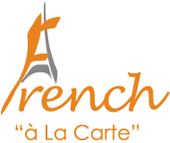Placement of French Adjectives: Before or After the Noun?
Most adjectives are generally placed after the noun. Some can also be placed before, while others can be placed before or after the noun, changing the meaning of the sentence.
Learn how to correctly place long and short adjectives in French with our simple and clear explanations and numerous examples.
Where to place the adjective in the sentence ?
In French, the adjective is generally placed after the noun
Example : Le lac gelé - the frozen lake
Color adjectives are always placed after the noun
Example: La fleur bleue - the blue flower
Short (and often used) adjectives are generally placed before the noun
Here is the list :
Beau / belle : beautiful
Bon/ bonne : good
Grand(e) : tall
Petit( e) : small
Jeune : young
Gros(se) : big
Jeune : young
Meilleur( e ) : better
Mauvais ( e) : bad
Examples :
Le jeune homme - the young man
Une petite maison - a small house
Un gros gâteau - a big cake
Une meilleure solution- a better option
Une belle peinture- a beautiful painting
Une bonne idée - a good idea
·A noun with two or more adjectives
When a noun is accompanied by two or more adjectives, they are placed after the noun if they are coordinated, i.e., connected by a coordinating conjunction (but, therefore, now, for, and, or, neither... nor...).
Examples
Elle a une maison blanche et moderne - she has a white and contemporary house
Il a un enfant intelligent mais distrait – he has a bright but distracted child
If they are not coordinated, they frame the noun they refer to.
Example
Elle porte une grande jupe bleu - She wears a big blue skirt
Movable French Adjectives
· Some adjectives can be placed before or after the noun; their meaning changes depending on their position (see table below)
Objective or Literal Meaning
Cher(e)
Un cher livre - beloved book ( subjective )
Un livre cher - expensive book ( objective literal meaning)
Curieux / se
Un curieux homme - curious (strange) man ( subjective )
Un homme curieux - curious (nosy) man ( objective literal meaning)
Dernier(e)
Le dernier mois - the last month (of the year) ( objective literal meaning)
Le mois dernier - last month (a month ago)
Doux ( ce)
Une douce voix - sweet voice ( subjective )
Le tissu doux - soft fabric ( objective literal meaning)
Grand(e)
Un grand homme - great man ( subjective )Un homme grand - tall man ( objective literal meaning)
Gros(se)
Un gros travail : big job ( subjective )
Un homme gros : fat man (objective literal meaning)
Jeune
Un jeune chien - a young dog (objective literal meaning)
Un visage jeune - youthful face ( subjective )
Méchant
Une méchante affaire - unsavory business ( subjective )
Un enfant méchant - naughty child (objective literal meaning)
Modeste
Un modeste employe - ordinary employee (objective literal meaning)
Un cadeau modeste - modest, small gift ( subjective )
Nouveau ( velle)
Une nouvelle voiture : a new car ( a recently manufactured car) objective literal meaning
Un vin nouveau - new, young wine
Pauvre
Un pauvre sourire - poor (weak) smile ( subjective )
Un pays pauvre : poor (not rich) country (objective literal meaning)
Premier
Le premier objectif - first objective (objective literal meaning)
L’objectif premier: primary, essential objective (subjective )
Propre
Son propre appartement - his own apartment
Une maison propre - a clean house ( objective literal meaning)
Seul
Le seul homme - the one/single/only man ( subjective )
Un homme seul - lonely man, man on his own ( objective literal meaning)
Triste
Un enfant triste - a sad child ( objective literal meaning)
Une triste histoire - sad story ( subjective )Exercice
Check if you have understood the rule with this exercise. The answers are at the end of the exercise.
C'est une………..maison………. (grand).
Il a acheté une ………voiture………. (nouveau).
J'ai trouvé un ……….restaurant………(italien) près d'ici.
Elle a un chien……….. (petit) et………. (brun).
Voici un………. film…………(intéressant) que j'ai vu hier.
J'ai une amie………..(sympathique) qui travaille dans cette entreprise.
Nous avons visité un………. musée………..(historique) la semaine dernière.
Elle a un frère……….. (jeune) et………..(dynamique).
J'ai reçu une ………..lettre……….. (formel) de l'entreprise.
Ils ont acheté des ………….chaussures……….. (confortable) pour la randonnée.
Réponses :
grande maison
nouvelle voiture
restaurant italien
petit chien brun
film amie intéressant
amie sympathique
musée historique
jeune frère dynamique
lettre formelle
chaussures confortables
You would like to brush up your grammar ?
Improve your grammar with a tutor from French à La Carte.
French à La Carte offers private French lessons in person ( in Paris) & online.
If you would like to improve French grammar, tenses, syntax, you should try our personalised French lessons carefully designed around each student.



